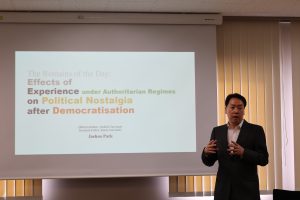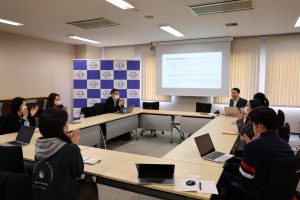On March 10, 2023, the Institute for Global Governance Research (GGR) hosted a GGR talk session entitled “The Remains of the Day: Effects of Experience under Authoritarian Regimes on Political Nostalgia after Democratization” with Mr. Jaehoo Park (DPhil Candidate, Department of Politics and International Relations, University of Oxford; Research Fellow, ASEAN Center, Asiatic Research Institute, Korea University).
Mr. Jaehoo Park started the session with the question his dissertation asked: Why do people have political nostalgia in favor of past authoritarianism? After that, Mr. Park continued to discuss how people’s experience of the authoritarian regime seems to be an important factor underlying the gap in political attitudes between the older and younger generations, giving as an example the impeachment of South Korea’s President in 2017. Thereafter, Mr. Park disclosed his second question: Does people’s experience of an authoritarian regime still affect their attitudes even after democratization? The literature review that Mr. Park conducted found a considerable body of literature on democratization, but this existing work largely focuses on explaining transitions to democracy or subsequent features of democracy. In his research, he chose nine countries to analyze authoritarian successor parties: Argentina, Brazil, Chile, Indonesia, Peru, South Korea, Spain, Taiwan and Uruguay. Mr. Park explained that his analysis considered three temporal points: (i) factors under an authoritarian regime, (ii) factors during transition, and (iii) factors after democratization. He went on to develop five hypotheses, using datasets from the World Bank, World Value Survey and V-dem. In interpreting his results, Mr. Jaehoo Park found that people who experienced better economic circumstances under authoritarian regimes are 7.1% more likely to support authoritarian successor parties, according to economic legitimacy. Meanwhile, people who suffered from repression under the authoritarian regime are less likely to support strong leaders. In terms of research design, Mr. Park clarified the organization of dependent, independent, and control variables.
Nine participants including faculty members and students took part in the Q&A session which followed the presentation. One question is of interest concerned how the countries included in the study were selected. Mr. Park replied that control variables were applied to choose appropriate countries for inclusion. The suggestion emerged from the participants to compare Asian, Eastern European, and Latin American countries.
【Event Report prepared by】
Hnin Htet Htet Aung (Master’s student, School of International and Public Policy)
Ryohei Suzuki (Doctoral student, Graduate School of Law)


